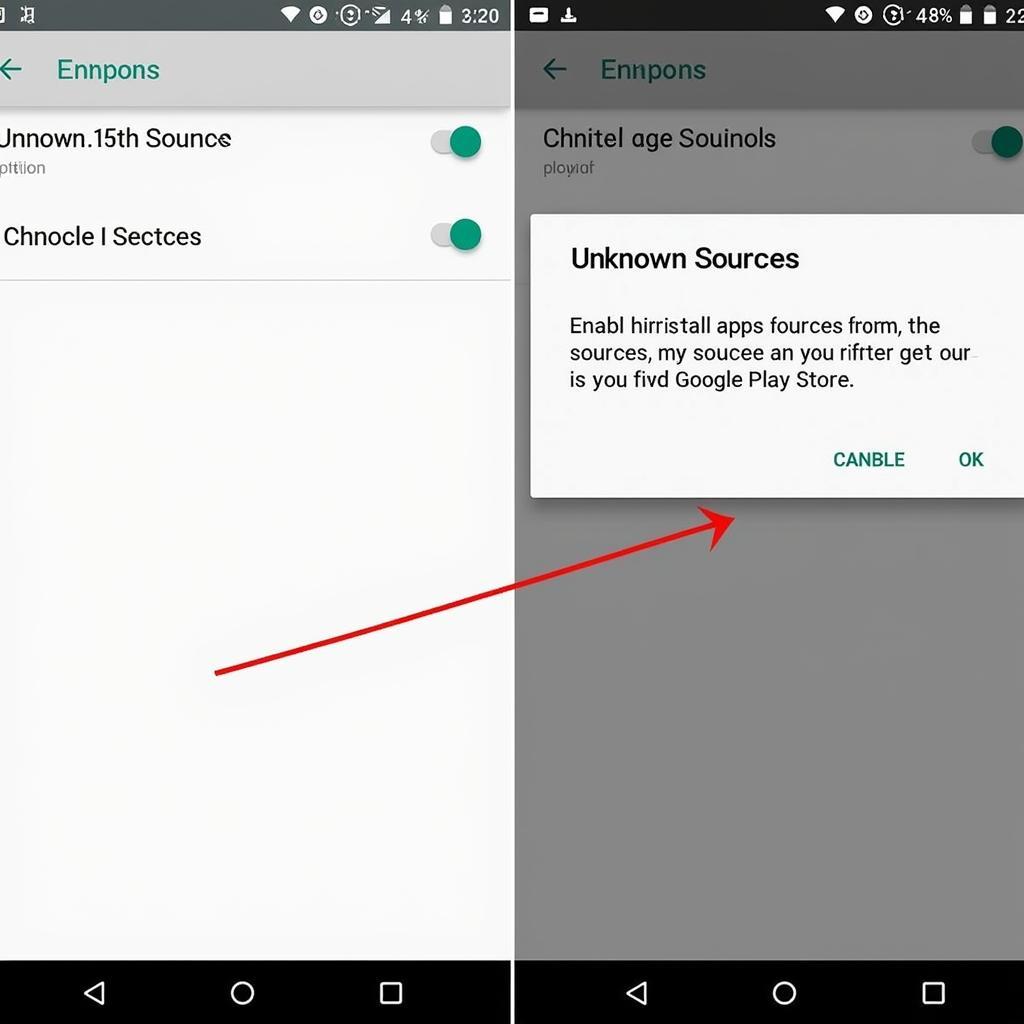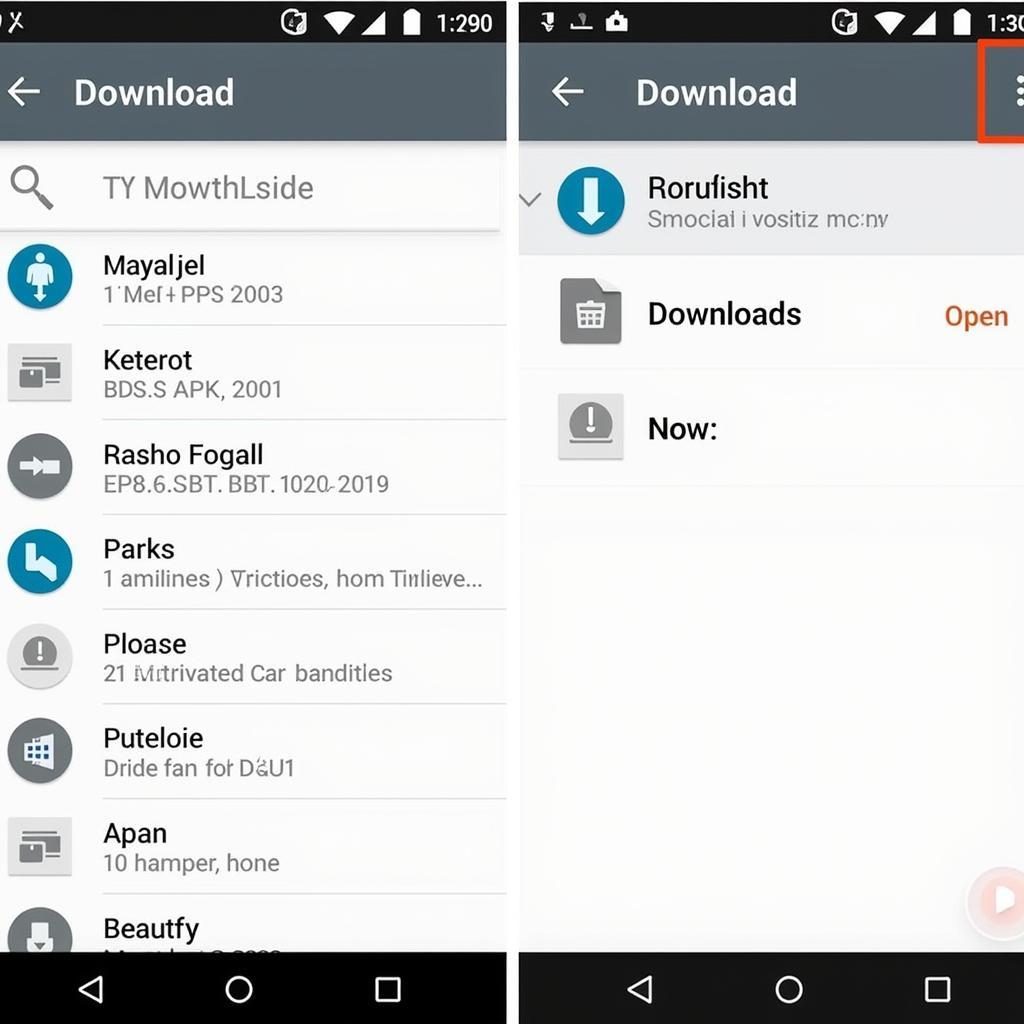Running APK files is essential for Android users who want to install apps from sources other than the Google Play Store. APK, which stands for Android Package Kit, is the file format used to distribute and install apps on Android devices. This comprehensive guide provides everything you need to know about APK files, including what they are, why you might use them, and how to run them safely on your device.
What is an APK File?
An APK file is essentially a package containing all the necessary files for a single Android app. Think of it like a ZIP file for software on your computer. Instead of a bunch of folders and files spread across your system, an APK neatly packages everything into a single file for easy installation and uninstallation.
Within an APK, you’ll find elements like:
- Code (DEX files): The actual program that makes the app run.
- Resources: Images, sounds, and other assets the app needs.
- Manifest file: A blueprint describing the app, its permissions, and other vital information.
- Signatures: Used for verifying the authenticity and integrity of the app.
Why Run APK Files?
While the Google Play Store is the official and most secure source for Android apps, there are several reasons why you might venture into the world of APKs:
- Early Access to Apps: Developers often release beta versions or regional exclusives through APKs before they hit the Play Store.
- Getting Apps Not on the Play Store: Some developers choose to distribute their apps independently for various reasons, like avoiding fees or offering features not permitted on the Play Store.
- Bypassing Regional Restrictions: You can use APKs to download apps unavailable in your country’s Play Store.
- Downgrading to Older App Versions: If you dislike an update, you can install an older version of the app via APK.
How to Run APK Files on Android
Running an APK file on your Android device is a straightforward process. Here’s a step-by-step guide:
-
Enable “Unknown Sources”: For security reasons, Android blocks installation from sources other than the Play Store by default. To change this, go to your device’s Settings > Security (or Privacy) > and enable the Unknown Sources option.
 Enabling Unknown Sources on Android Settings
Enabling Unknown Sources on Android Settings -
Download the APK File: Find a reputable source for the APK file you want to install. Websites like APKMirror and APKPure are generally considered safe options. Download the APK file to your device’s storage or SD card.
-
Locate and Open the APK File: Use a file manager app (most Android devices come with one pre-installed) to navigate to the location where you downloaded the APK. Tap on the APK file to open it.
 Opening an APK File Using a File Manager App
Opening an APK File Using a File Manager App -
Install the App: Android will display the app’s permissions and other details. Review them carefully, and if you agree, tap on Install to begin the installation process.
-
Launch the App: Once the installation is complete, you can tap on Open to launch the app or find it in your app drawer.
Risks of Running APK Files
While APK files offer flexibility and access to a wider range of apps, it’s crucial to be aware of the potential risks:
-
Malware: Downloading APKs from untrusted sources can expose your device to malicious software like viruses, trojans, and spyware.
-
Data Theft: Malicious apps disguised as legitimate ones can steal your personal information, like passwords, banking details, and contacts.
-
Device Instability: Poorly coded apps or those incompatible with your device can lead to crashes, errors, and even data loss.
Tips for Staying Safe
To minimize the risks associated with running APK files, consider these essential tips:
-
Download from Trusted Sources: Stick to well-known and reputable websites like APKMirror, APKPure, and F-Droid. These platforms scan uploaded APKs for malware and provide user reviews to help you make informed decisions.
-
Verify App Permissions: Before installing an app, carefully review the permissions it requests. If an app asks for access to sensitive data or features that seem unnecessary for its functionality, it’s a red flag.
-
Use a Security App: Install a reputable mobile antivirus app on your device. This will provide an extra layer of protection by scanning APK files for malware before installation and monitoring your device for suspicious activity.
-
Keep Your Device Updated: Regularly update your Android operating system and installed apps to patch security vulnerabilities.
-
Be Cautious with Third-Party App Stores: While some third-party app stores might seem convenient, they often lack the security measures of the Play Store. Avoid using them unless you’re absolutely sure about their trustworthiness.
Conclusion
Running APK files offers Android users a way to access a broader range of apps and enjoy greater control over their devices. However, it’s essential to approach APKs with caution and take necessary precautions to mitigate the inherent risks. By understanding the potential dangers and following the safety tips outlined in this guide, you can confidently explore the world of APKs while keeping your device and data secure.
Remember, when in doubt, it’s always best to err on the side of caution and stick to the official Google Play Store for your app downloads. If you need assistance with installing apps or have any concerns about the safety of an APK file, contact a trusted tech expert or your device manufacturer for guidance.
FAQs
1. Is it legal to run APK files?
Yes, running APK files is perfectly legal, provided you’re not downloading copyrighted apps without permission.
2. Can I run APK files on iOS devices?
No, APK files are specifically designed for Android devices and cannot be run on iOS devices like iPhones and iPads.
3. Do I need to root my device to run APK files?
No, rooting is not required for running APK files. You can install apps from sources other than the Play Store by simply enabling the “Unknown Sources” option in your device’s settings.
4. How do I know if an APK file is safe?
While there’s no foolproof way to guarantee the safety of an APK file, downloading from reputable sources, checking app permissions, and using a security app can significantly reduce the risks.
5. What should I do if I encounter problems after running an APK file?
If you experience issues like app crashes, errors, or unusual behavior, try uninstalling the app and reinstalling it from a different source. If the problem persists, it’s best to contact the app developer or your device manufacturer for assistance.
6. Can I update apps installed via APK?
In most cases, apps installed via APK can be updated automatically through the Play Store, just like apps downloaded directly from there. However, if the app was downloaded from a source other than the Play Store, you might need to manually download and install updates.
7. Is it safe to run APK files on a work device?
Running APK files on a work device, especially one managed by your employer, can pose security risks and might even violate company policy. It’s generally advisable to consult with your IT department before installing apps from sources other than the official app store approved by your organization.
Need Further Assistance?
If you have any questions or need assistance with running APK files, please don’t hesitate to contact our team at:
Phone Number: 0977693168
Email: [email protected]
Address: 219 Đồng Đăng, Việt Hưng, Hạ Long, Quảng Ninh 200000, Việt Nam
Our customer support team is available 24/7 to assist you.